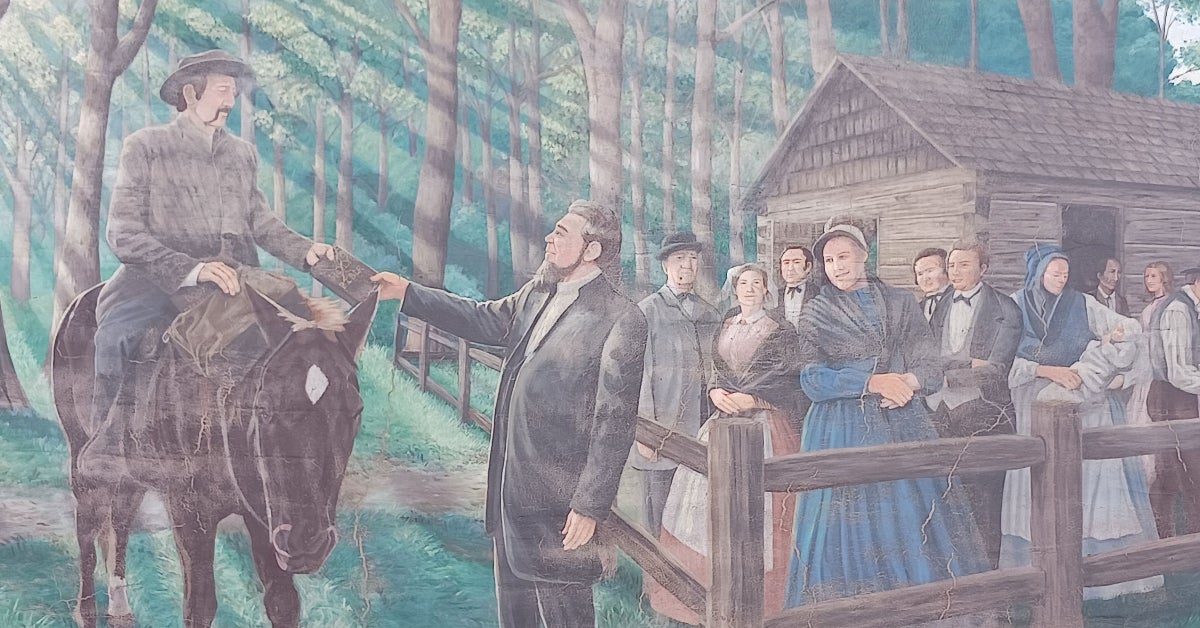FAITH OF OUR FOREFATHERS: Program to discuss Methodism, Newitt Vick
Published 4:00 am Sunday, August 21, 2022

- This mural at the Vicksburg Riverfront illustrates the way Methodist circuit riders, like Newitt Vick, would travel on horseback to preach the Gospel in the 1800s. (Photo by John Surratt | The Vicksburg Post)
In the early 1800s, Newitt Vick, a Methodist circuit rider, came to Warren County and settled in the area then called The Walnut Hills.
He later built a plantation and a Methodist church on his property and had a vision for the town that would one day bear his name on the bluffs overlooking the Mississippi River.
Methodism’s and Newitt Vick’s role in Vicksburg’s founding is the topic of a Taste of Vicksburg program being presented at noon on Aug. 26 by the Rev. John Evans, pastor of Bovina United Methodist Church. The cost is $15 per person and includes lunch.
Methodism, Evans said, was a revivalist movement inside the Church of England in the 1730s and 40s started by two Anglican priests, John Wesley and his brother, Charles Wesley.
“They never had the intention of forming a denomination,” Evans said. “The Church of England was getting pretty stifling. They didn’t want to preach to the coal miners; they got rather society-minded and John Wesley felt like everybody needed to hear the gospel.”
Wesley’s efforts to spread the gospel resulted in him being forbidden from preaching in Anglican Churches so he and his followers began preaching in the open air.
“They were ridiculed in England,” Evans said. “They were called Methodists because they were so methodical in their behavior — they got up at a certain time every day; they prayed at a certain time every day; they fasted and read the Bible at a certain time. Somebody said they’re so methodical; they’re a bunch of Methodists. It was really a term of derision.”
During the revolution, he said, John Wesley felt it was a good time for the Methodists to separate from the Church of England because that might help it to grow in America and he ordained Francis Asbury and Thomas Coke as bishops to form the Methodist Church in the United States in the 1790s. Asbury, he said, was a circuit rider; one of a group of preachers who traveled through the country holding services wherever they could.
“Circuit riders had a hard life,” Evans said. “They didn’t have a house. They had a horse, a Bible, a hymnbook and a warm coat and change of clothes, maybe. Wherever they preached that day they would hope somebody would invite them to eat with them and put them up at night, and then they would leave in the morning for the next station or next little town.”
The circuit preacher may sometimes go to seven, eight or nine different locations, he said, and may not preach at the same location every Sunday.
“Sometimes they didn’t have a church built; it may have been a school building, someone’s house or may have been in the open air,” he said.
Most of the early Methodist preachers who came to Mississippi had very little formal education, and most of them came down from the Carolinas.
“They generally came from good families and in early Methodism had an urge just to go evangelize the entire nation,” Evans said. “People told them if you go down to the Mississippi territory — which had just been deeded over to the U.S. in 1798 — there’s a lot of land you can get cheap.”
Vick, an excellent businessman, came to Mississippi for both commercial and religious purposes, “Both to be a large farmer and plantation owner and be a great businessman and take advantage of all the property in the area, as well as a local pastor— to be one of the Methodist missionaries in the area,” Evans said.
He said the first missionary was Tobias Gibson, who came in 1798 and started the first Methodist church in the Natchez area and then came up to the Vicksburg area and started a couple of churches in the area at Warrenton.
“Tobias died at an early age, transferring the mantel to Vick and his son-in-law, John Lane, to basically start a settlement in the Vicksburg area that later became Vicksburg,” he said.
Vick, he said, lived in Virginia and North Carolina before moving to Mississippi. He first lived near Fayette before coming to the Vicksburg area, where he had family.
“He had a nephew, Foster Cook, who told him there was a lot of valuable land that was good for farming and had been cleared by the Indians and called open woods,” Evans said. “He bought a lot of additional land along the Mississippi. He erected a log church near his plantation, where he preached until his death in 1819. He lived in Warren County for five years and was the only minister in the northern part of the county.
“He was really what we would call the first local preacher in what became Louisiana, Mississippi and Alabama,” he said. “Local preacher because he settled in not as a circuit rider but saying, ‘I’m here at this location every Sunday at this church.’”
Vick, Evans said, began subdividing his land into 1,500- to 1,600-acre lots and selling them for his town, but only sold one lot before his death. His son-in-law continued the land sales. The town was named Vicksburg in 1825 in honor of Vick because he initiated the process of forming the town. In 1826, Vicksburg became the county seat.






